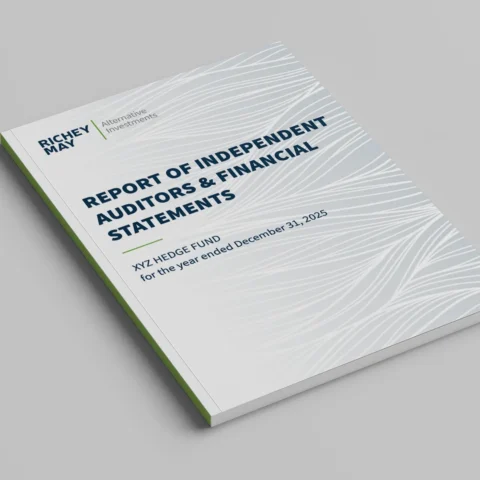Mortgage banking saw heady times in the post-COVID years. Then 9% inflation happened, and the Fed applied the brakes, sending mortgage rates soaring to 7%.
When the dust settled, many independent mortgage banks (IMBs) suddenly had to do more with less – less time, less money, less staff. If you were one of them, you weren’t alone. If you lost your controller or accountant – or never had the budget to hire one – you’re not alone there either. But you still need someone to do the job, and the cost to hire an experienced mortgage accountant starts around $92K, not to mention the cost of an experienced controller which will put you well beyond that.
Meet CAAS
The answer? Outsource with Richey May’s Client Accounting & Advisory Services (CAAS). It’s an elegant solution to what’s become a very common challenge, especially for IMBs coping with shrinking production volumes and rising costs per loan.Whether you have no accounting expertise in-house or you have a controller with no mortgage experience, you can tap the CAAS team for the support you need.
To learn more, we talked with resident CPA/CAAS Director and Practice Leader Kimberly Dittmer. An expert in the mortgage space, she explains how CAAS fills the gaps, from consulting with startups making the broker-to-banker transition to providing fully outsourced accounting to larger, more established IMBs.
Ad hoc or adjunct
Why outsource with CAAS? Ad hoc or adjunct, CAAS adds up to an affordable, reliable solution that simplifies life for a variety of clients. We called on Dittmer for the who, what, why and where to from here.
Q: CAAS is such a vital service these days. Tell us first, how big is your team?
A: There’s 13 people, including myself and five managers. Many of our managers specialize in mortgage banking accounting, so their expertise is what really drives value for clients.
Q: Who should outsource with CAAS?
A: Any IMB who is looking for mortgage accounting expertise at a fraction of the cost is a good fit for our flexible solutions. We work with small to mid-sized IMBs with production in the range of 50 loans to a few hundred loans per month as well as the large IMBs and investors who may have well over 1,000 loans per month. We help many of the small startup IMBs who don’t use loan-level activity yet. Maybe they’ve been mortgage brokers and want to start the conversion to a banker. We can help the larger IMBs by becoming their fully outsourced function or supplement and train their existing team members.
Q: Ok, so now let’s parse those out one at a time. What do your engagements with the startups look like?
A: In that scenario, a lot of our time would be spent on consulting, helping them get things set up the right way, and getting them to think through the key things to get everything right from the start. They’re typically our hourly clients, and they may need us once a week in the beginning. But over time they just call on us when they’re starting to make key decisions. We perform our services in conjunction with our mortgage tax team members to create synergies for our clients and make it easier to go beyond outsourced accounting services for tax services when the time comes. By using our teams for both, we can bring our industry expertise and help streamline your vendor management.
Q: Makes sense. And what about the smaller IMBs?
A: For small IMBs we typically do full outsourced accounting, mainly around capturing loan-level activity and making sure it’s reconciling to their warehouse bank reports. We do that on a weekly basis to keep up rather than waiting until month end when it becomes more cumbersome to research certain items and try to close the books. We also reconcile cash accounts and other balance sheet accounts and make GAAP accounting entries. And we’re getting the servicer remittance advices and recording principle and interest payments. Essentially, we handle all the monthly accounting entries and analysis and provide our clients with financial reporting to help them understand their business. For some clients, we also help support them with accounts payable, payroll processing, and entering purchase advises from the sale of loans.
Q: It sounds like the bulk of your clients are the small IMBs, some of which have no accounting expertise in-house.
A: Yes, sometimes it’s just the president or CEO or founders that know they need accounting but don’t necessarily want to hire a controller or CFO, and they reach out to us and say, ‘Hey, can you get us set up on a system and do all the accounting?’ Then we’ll typically have a weekly update with them to go through where we are and any questions and then go over reporting at the end of the month.
Q: So you function like an in-house accounting department. And what about larger IMBs?
A: Sometimes they have a CFO or controller or both, and they just need worker bees, so to speak, to do the imports and reconciliations and report back. Or some might hire a new controller who has no mortgage accounting experience. We often do process review, evaluation, and other special projects for large IMBs. In the mortgage business accounting is a bridge within the organization so you need to understand the nuances of loan origination and/or servicing as well as secondary. The accounting team needs to be able to understand operations and how it affects both accounting and reporting to be successful. So while we’re doing some of that worker bee type stuff, we might also have a manager training the new controller or CFO on the specifics of mortgage accounting.
Q: What’s the mood now that lending levels are down? Are some IMBs scaling back?
A: We’ve seen a bit of everything. There’s obviously been turnover of roles, controller roles, staff accountant and the like. What we’ve tried to point clients to is that if you have an outsourced model with a company like Richey May, it’s much easier to just pick up the phone and call us and say, ‘Hey, you know, we can’t afford this right now. Our production has declined by 50%, so can you work with us? It’s technically maybe half the work, so only charge us half of what you were charging us.’ Then they can make those kinds of adjustments. They can scale up or down much more easily with an outsourced model versus having to layoff and rehire employees.
Q: So you’re actually helping to prevent layoffs. That’s great. So why come to Richey May under normal circumstances? Is it for seasonal fluctuations in business?
A: We’ve definitely had some of that. We even have a client that had someone go out on maternity leave and we were able to cover for them while they were out. So we’ve had several clients reach out and want to either scale up because they had to lay off somebody or scale down because they need to cut back on some fees. And that’s hard. Because this isn’t just a practical solution we’re providing. It’s emotional too. They’re feeling a lot of different feelings these days. Outside of market fluctuations, there is a tremendous shortage of accounting talent, so it is really hard to hire people, especially those with mortgage experience. Richey May has the staff and the mortgage experience and can jump in right away.
Q: So true. It’s business, but we’re human. So where to from here?
A: Start thinking about outsourcing bookkeeping, accounting, or CFO/controller functions. And don’t hesitate to reach out to the Richey May CAAS team for help. Most of all, remember this industry is very cyclical, so stay focused on the long-term strategy.
To learn more about our outsourced accounting and staff augmentation, consulting and accounting system implementation services, contact Kimberly Dittmer, CPA/Director of Client Accounting & Advisory Services at kdittmer@richeymay.com.





